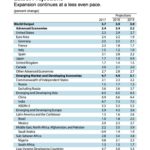Several other bloggers/columnists that I follow have pointed this out so I will as well. The International Monetary Fund (IMF) just issued its projected growth report for various world economies. Here it is:

I know, it is hard to read. Here is a link to the report, which is Table 1 on the IMF Website: https://www.imf.org/en/Publications/WEO/Issues/2018/07/02/world-economic-outlook-update-july-2018
Good News
There is a lot of good news in the report. The IMF projects worldwide economic growth to be 3.9% in both 2018 and 2019. That’s a significant growth rate! Emerging economies are projected to grow in the 5%-range for the next two years and Advanced economies in the low-2% range. There are zero regions in which the IMF projects there will be negative growth for the next 2 years. That is very good news for world economies!
Emerging Markets
What constitutes an Emerging Market for the IMF? The two largest are China and India, the two most populous countries on earth. Together, they represent most of the projected growth: Mid-6’s for China and mid-7’s for India. Pretty much every country except for the US, Western Europe, Canada, and Japan are Emerging Markets. Russia is the laggard among Emerging Markets, with growth there projected at only 1.5%. I see no downside to economic growth in Emerging markets. Growth means more people will become employed, which means more tax revenues to the respective governments, which means more services to their populations. Capitalism at its best.
Bad News
From an investor’s perspective, the bad news (if you want to call it that) is that the US economy is among the strongest in the Advanced world. Because the US economy is stronger, our interest rates are going up faster than those in other Advanced Economies. Higher US interest rates mean that the US Dollar will strengthen and other currencies will weaken, in relative terms. For countries, especially Emerging countries, who need US Dollars to pay for goods such as petroleum products, the stronger US Dollar means those goods they need become more expensive, which may hinder their growth. Thus, it is not as simple as looking at these IMF projections and conclude that you should buy Emerging Market equities because their growth will be greater. The changes in currency values will be a check on the economic growth. Will the US Dollar strengthen so much that it will overshoot the growth in Emerging Markets, and therefore cause Emerging Market stocks and ETF’s to depreciate in Dollar-denominated value despite their greater growth? That is what we investment managers use our crystal balls for.
IMO
I think the US Dollar will not increase substantially more from where it is now because other economies and central banks will also raise interest rates as their economies grow faster. Therefore I think it is wise to at least have exposure to if not overweight Emerging Market stocks through ETF’s such as iShares EEM. Having international exposure is always a good idea and the high growth rate just projected by the IMF is another reason why you should not have all of your eggs in the basket of US markets.
